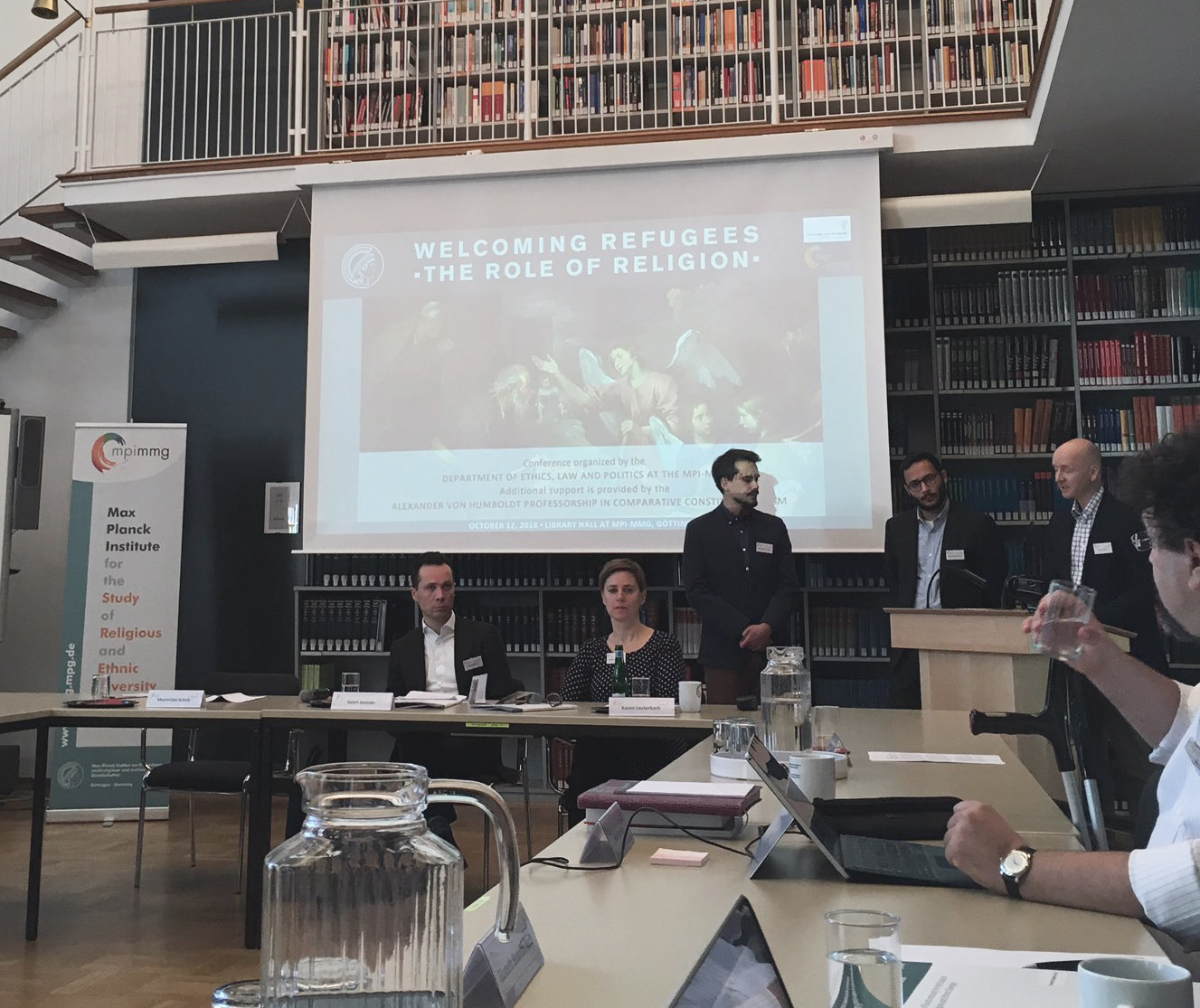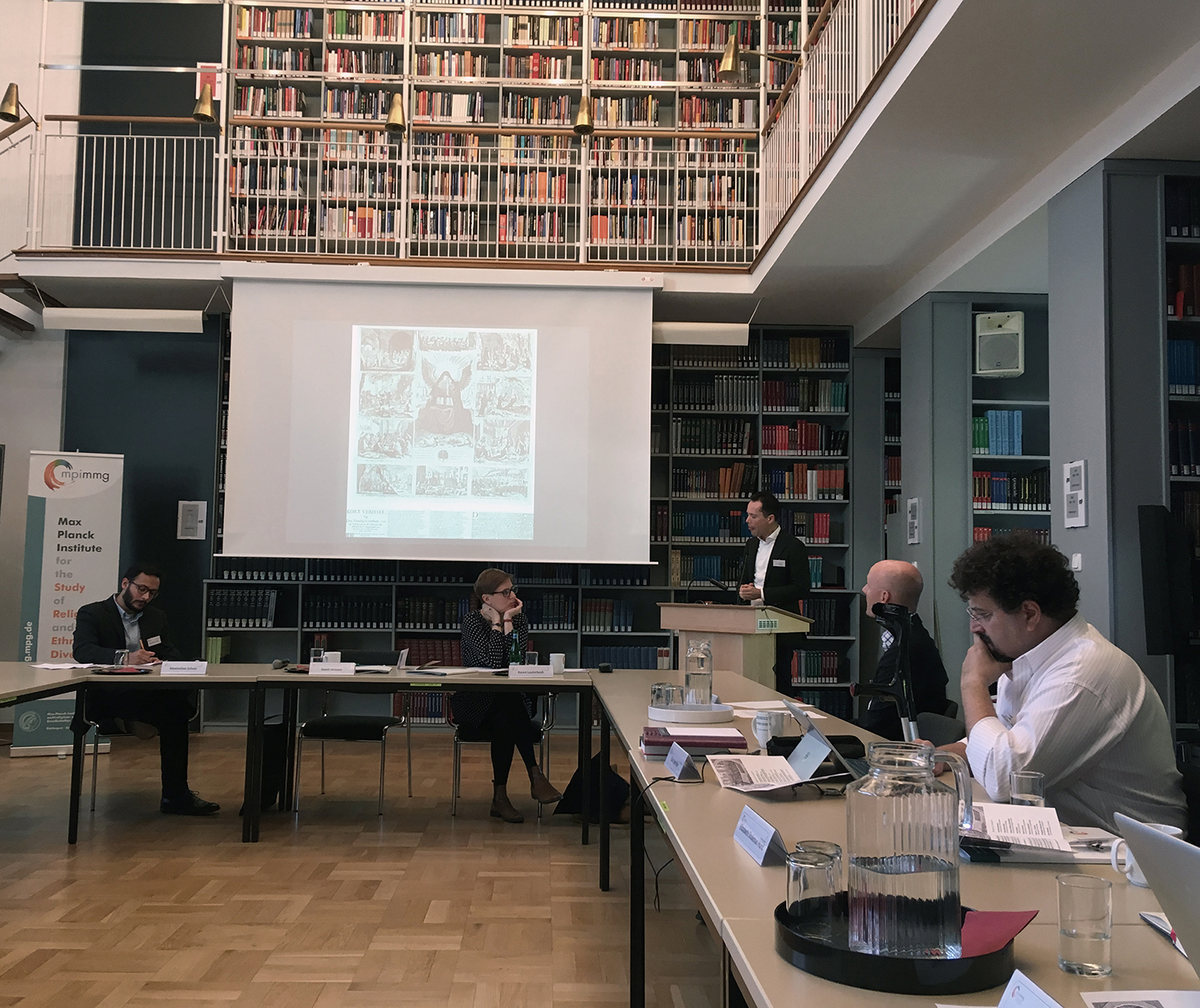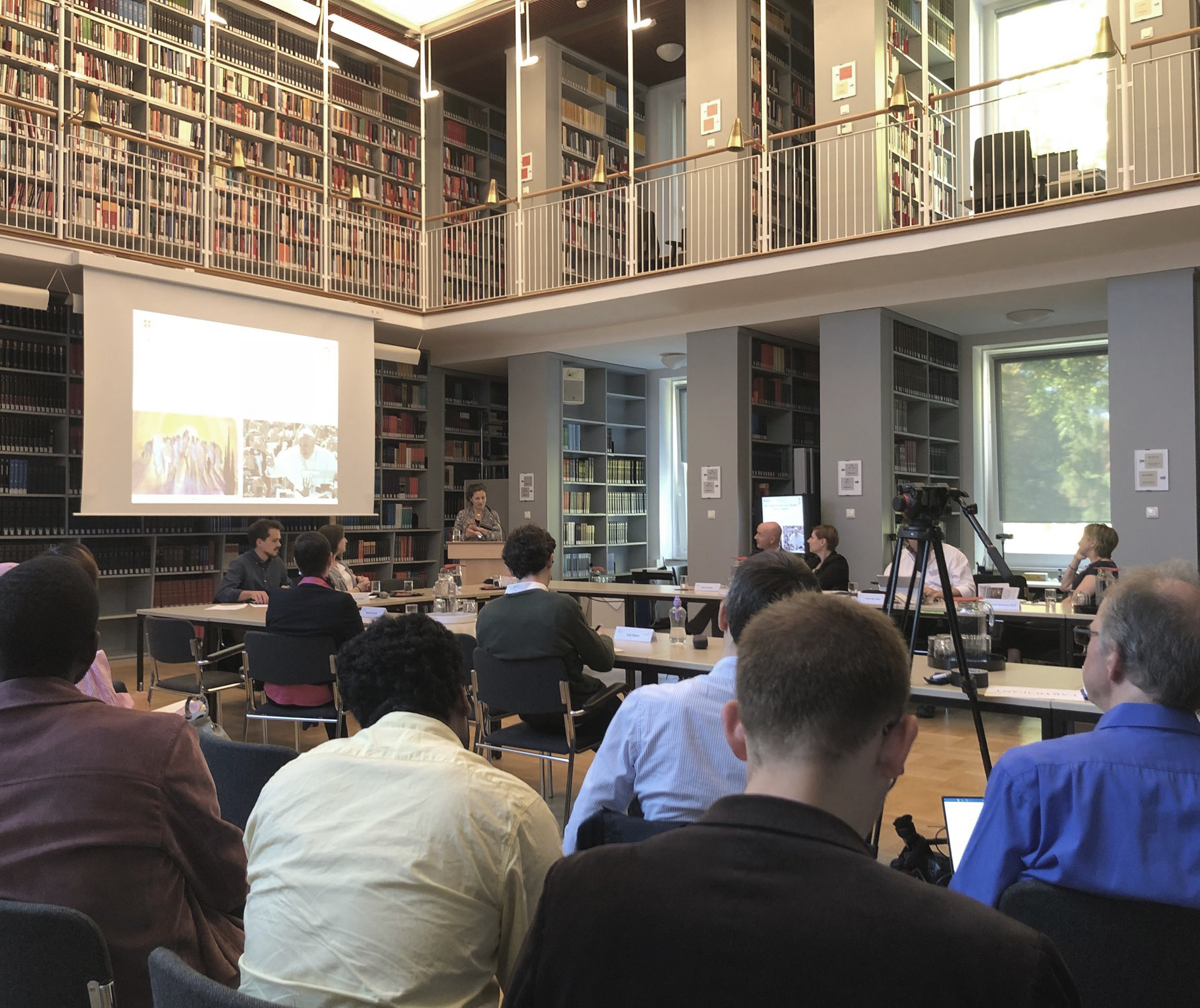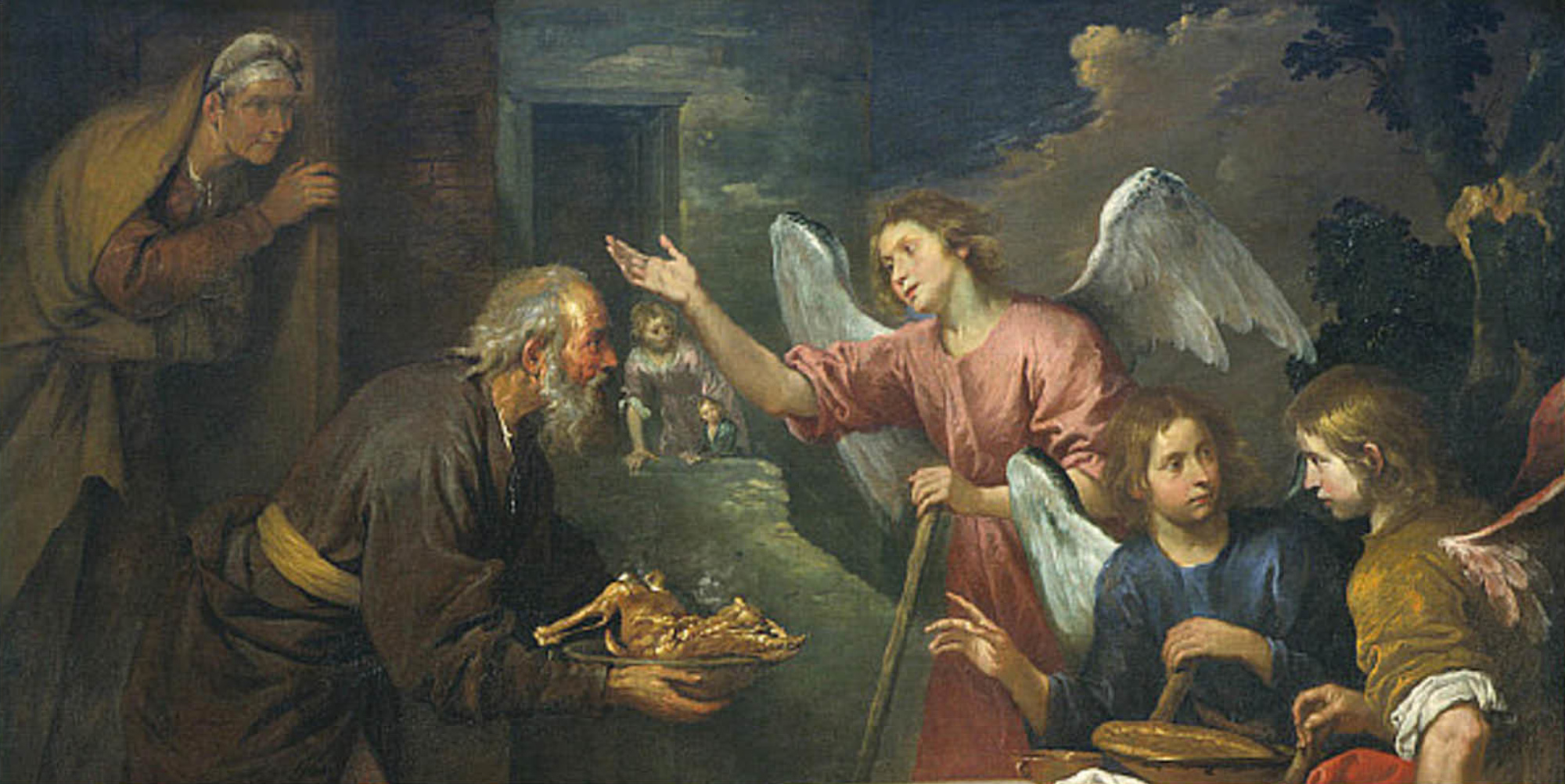Keynote Lecture by Elena Fiddian-Qasmiyeh (UCL): “From the Local to the Global: The Roles of Local Faith Communities in Refugee Situations in the Global South”
Summary
by mAXIMILIAN sCHOLZ
 Religion has played an essential role in debates about refugee accommodation both as a justification for the expansion of refugee protections and as a motivation for fighting such accommodation. Yet the role of religion often goes unexamined as the modern nation-state has become the primary focus of advocacy regarding refugees and refugee policy. Over one day in Göttingen, “Welcoming Refugees: The Role of Religion” refocused attention on the centrality of religious justifications and religious organizations in the accommodation of refugees. Scholars from diverse disciplines scrutinized the relationship between religion and refugee accommodation in history, in contemporary society, and in political theory.
Religion has played an essential role in debates about refugee accommodation both as a justification for the expansion of refugee protections and as a motivation for fighting such accommodation. Yet the role of religion often goes unexamined as the modern nation-state has become the primary focus of advocacy regarding refugees and refugee policy. Over one day in Göttingen, “Welcoming Refugees: The Role of Religion” refocused attention on the centrality of religious justifications and religious organizations in the accommodation of refugees. Scholars from diverse disciplines scrutinized the relationship between religion and refugee accommodation in history, in contemporary society, and in political theory. Panel 1: – Drs. Geert Janssen and Karen Lauterbach
 The conference opened with a panel focused on refugee churches and their importance for facilitating the accommodation of newly displaced individuals. Dr. Geert Janssen (University of Amsterdam) began by guiding the conference participants back four centuries into the world of early modern Europe, when the word ‘refugee’ (réfugié) first emerged. Drawing on his archival research on Dutch, English, and French refugees in the sixteenth, seventeenth, and eighteenth centuries, Janssen showed how displaced religious communities began to call themselves and their persecuted coreligionists “refugees” in order to demonstrate that they deserved protection. Thus, the concept of the refugee in Europe emerged within the context of refugee churches as a way to advocate for the religiously persecuted. Dr. Karen Lauterbach (University of Copenhagen) then shared her research on refugee churches in present day Kampala, research which establishes unequivocally the continued centrality of refugee churches for the accommodation of displaced peoples. Examining a series of Pentecostal churches in Kampala and their efforts to shelter and provide for Congolese refugees, Lauterbach uncovered the deeply held religious convictions that inspired refugee pastors and refugee parishioners to welcome and feed newly arriving Congolese people. And although Lauterbach questioned the coherence and essentializing character of the term “refugee church,” she demonstrated beyond a doubt that religious communities of refugees were primary facilitators of refugee protection, irrespective of the religious affiliations of the newly arrived.
The conference opened with a panel focused on refugee churches and their importance for facilitating the accommodation of newly displaced individuals. Dr. Geert Janssen (University of Amsterdam) began by guiding the conference participants back four centuries into the world of early modern Europe, when the word ‘refugee’ (réfugié) first emerged. Drawing on his archival research on Dutch, English, and French refugees in the sixteenth, seventeenth, and eighteenth centuries, Janssen showed how displaced religious communities began to call themselves and their persecuted coreligionists “refugees” in order to demonstrate that they deserved protection. Thus, the concept of the refugee in Europe emerged within the context of refugee churches as a way to advocate for the religiously persecuted. Dr. Karen Lauterbach (University of Copenhagen) then shared her research on refugee churches in present day Kampala, research which establishes unequivocally the continued centrality of refugee churches for the accommodation of displaced peoples. Examining a series of Pentecostal churches in Kampala and their efforts to shelter and provide for Congolese refugees, Lauterbach uncovered the deeply held religious convictions that inspired refugee pastors and refugee parishioners to welcome and feed newly arriving Congolese people. And although Lauterbach questioned the coherence and essentializing character of the term “refugee church,” she demonstrated beyond a doubt that religious communities of refugees were primary facilitators of refugee protection, irrespective of the religious affiliations of the newly arrived.
Panel 2 – Drs. Aurélia Bardon and Sara Silvestri
 The second panel of the day explored the theoretical dimensions of religious justifications for refugee accommodation. Dr. Aurélia Bardon (University of Konstanz) began the panel by posing the question: Does the Pope’s profoundly religious support for refugee accommodation contradict liberal public reason? Pope Francis’s support for refugee accommodation has earned him global praise from refugee advocates, even non-Catholic advocates. Bardon asked whether the Pope’s Catholic reasoning and Catholic audience should discredit his arguments from a liberal, Rawlsian perspective. She answered with a clear “No.” Her presentation revealed the profound overlap possible between religious reasoning and Rawlsian public reason. Bardon concluded by suggesting that the “familiarity” of religious arguments could make them particularly effective in advocating for the displaced. Dr. Sara Silvestri (City University of London) continued the panel’s focus on Pope Francis and his recent advocacy for refugees. Silvestri marshalled detailed historical evidence to prove that the papal curia had long advocated for refugee accommodation. Pope Francis was not the beginning of the story. Her study of Catholic advocacy then presented evidence—drawn from European and U.S. examples—of the practical and discursive ways in which Catholic leaders and NGOs have addressed the needs of refugees and the ways in which these efforts complement secular institutions and policy networks. Assessing these initiatives, Silvestri made the bold claim that Catholicism’s justification for refugee accommodation through moral values and political theology lends it a sui generis position within global conversations on displacement today, a claim which sparked a lively debate in the Q&A.
The second panel of the day explored the theoretical dimensions of religious justifications for refugee accommodation. Dr. Aurélia Bardon (University of Konstanz) began the panel by posing the question: Does the Pope’s profoundly religious support for refugee accommodation contradict liberal public reason? Pope Francis’s support for refugee accommodation has earned him global praise from refugee advocates, even non-Catholic advocates. Bardon asked whether the Pope’s Catholic reasoning and Catholic audience should discredit his arguments from a liberal, Rawlsian perspective. She answered with a clear “No.” Her presentation revealed the profound overlap possible between religious reasoning and Rawlsian public reason. Bardon concluded by suggesting that the “familiarity” of religious arguments could make them particularly effective in advocating for the displaced. Dr. Sara Silvestri (City University of London) continued the panel’s focus on Pope Francis and his recent advocacy for refugees. Silvestri marshalled detailed historical evidence to prove that the papal curia had long advocated for refugee accommodation. Pope Francis was not the beginning of the story. Her study of Catholic advocacy then presented evidence—drawn from European and U.S. examples—of the practical and discursive ways in which Catholic leaders and NGOs have addressed the needs of refugees and the ways in which these efforts complement secular institutions and policy networks. Assessing these initiatives, Silvestri made the bold claim that Catholicism’s justification for refugee accommodation through moral values and political theology lends it a sui generis position within global conversations on displacement today, a claim which sparked a lively debate in the Q&A.
